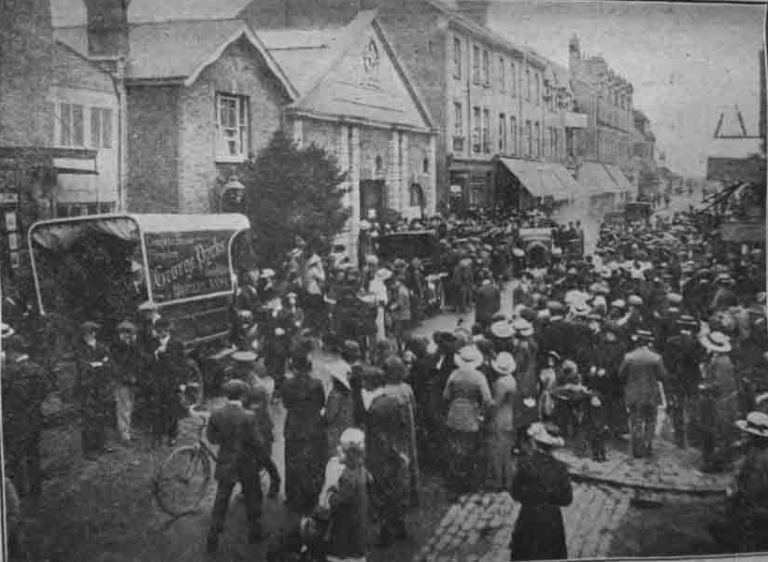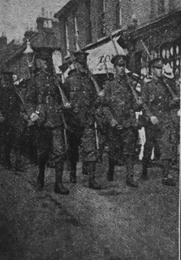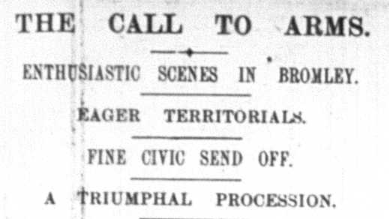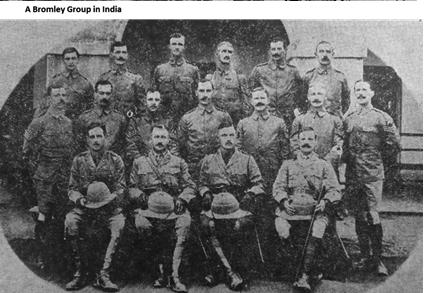The First Boys of Bromley Who Went Away to War

After weeks of speculation and mounting tensions, on Tuesday 4th August 1914, at 8am, the German Army invaded Belgium. Britain leapt to defend their little ally and an ultimatum was immediately sent to Germany to withdraw its troops. When no response was received by 11pm that evening, Britain declared war on Germany.
The men of Bromley were ready to play their part in the forthcoming war. Many were already trained for battle having already enlisted in the regular British army, or were on reserve; those of the territorial force, those in the naval reserve and the men in the fledgling air service.

the Drill Hall, Bomley, 1914
The men came from all walks of life and between 1914 and 1918, Bromley was well represented in the different theatres of war: The Western Front, The Dardanelles and Gallipoli, Mesopotamia, Egypt, India and South Africa.
The Bromley Times reported the feelings of the times:
“The past five days have been of momentous happenings in Bromley. War and war close at hand has come with an amazing suddenness and on a scale that is appalling.”
“The call has come for men. It has gone through the length and breadth of this country, and moving scenes of the greatest significance and enthusiasm have been of daily occurrence in every town of the kingdom.”
“In Bromley, the week has been of excitement and expectation, and day after day, people have waited for hours in the streets, expecting they did not quite know what, discussing the ever-deepening gravity of the situation, but fully prepared for the announcement that war was declared” – BDT, 14th August, 1914 (pg 3)
the call to Arms is called
When the Call to Arms was declared, the news soon reached the local press.
The first Bromley men to go to war were members of the Regular Army, followed by the mobilisation of the Reserves; men who had already served their time in the Army and were paid to be ready to be called up in case of emergency.

As call-up paper arrived, several men left their jobs to answer the call.
“Nine of the local police have been called up for service – a sergeant and three constables, who were naval reservists; a sergeant and a constable (marines) and three other constables (army reserves).”
“Three naval reserve men, thirteen arm reservists and one volunteer, employed at Bromley Post Office, have been called for service. two employed in the telephonic department have been transferred to Chatham (where the royal engineers were based).”
“The postmen Reservists received the war office notices while making deliveries, which they left in order to report themselves.” – BDT, 7th August, 1949 (pg 5)
The (Queen’s Own) Royal West Kent Regiment was the local regiment for Bromley and district.
There were over 2,200 entries on our Military Ancestors database for soldiers from this regiment who appeared in the Bromley & District Times newspaper throughout 1914 alone. On the 14th August 1914, 149 soldiers were listed as having signed up, with many more names appearing in the weeks ahead.
This photograph of officers from the 5th Battalion Queen’s Own Royal West Kent and sergeants of the Bromley Companies appeared in the Bromley & District Times in May 1915.
Many of these names can be found on the database:
First Row (L-R):
Colonel F A Fraser, Major C Douglas Clark, Sergeant-Major W Reeves.
Middle Row (L-R):
Pioneer-Sergeant Dunford, Sergeant Harman, Colour-Sergeant-Instructor Lander
Back Row (L-R):
Sergeants Stanley, Weatherill, Fawsitt, Kingsnorth, Gray

and the sergeants of the Bromley Companies
Further your research
This article has taken extracts from The Boys of Bromley Who Went Away to War (chapter 2) in Living Through the Great War by Pam Preedy.
BDT = Bromley & District Times
